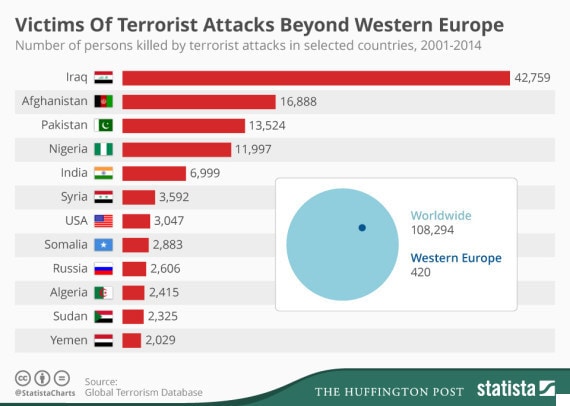Is terrorism in Europe at a historical high?

Timeline of terror ... the 1980s were far more deadly than today, according to the data Image: REUTERS/Christian Hartmann

Get involved with our crowdsourced digital platform to deliver impact at scale
Stay up to date:
International Security
With the recent attacks on Brussels, Paris and Turkey, the threat of terrorism understandably looms large in the minds of many Europeans. But our perspective may be historically skewed: the data shows this isn't actually the deadliest spate of terrorist attacks the region has seen.
This chart uses information from the Global Terrorism Database to show the number of deaths caused by terrorism in Western Europe between 1970 and 2015.

The number of fatalities from terrorist attacks between 1970 and 1990 amount to considerably more than those killed between 1990 and 2015.
In 1988, more than 425 people were killed in terror-related attacks in Western Europe. One of the most fatal, the bombing of Pan Am flight 103, led to the deaths of 270 people when the plane came down in the Scottish town of Lockerbie.
From 2000 to 2015 the death toll from terrorist attacks drops, with most years seeing less than 50 fatalities, a stark contrast to the years leading up to 1990 when more than 150 people died almost every year.
Since the turn of the millennium, Western Europe has seen a series of devastating terrorist attacks, including the deaths of 191 people in the 2004 Madrid train bombings, 52 people in the 2005 London bombings and the killing of 77 people in Norway in 2011 by lone-wolf terrorist Anders Behring Breivik. In last year's Paris attacks,130 lost their lives.
"Western Europe is safer now than it has been for decades and is far safer than most other parts of the world,” said Dr Adrian Gallagher, Associate Professor in International Security at Leeds University.
He adds that this chart would “support the idea that Western Europe is perhaps more peaceful now than at any point in modern human history". And in fact, Western Europe experiences a very small percentage of deaths from terrorism across the world.

Between 2001 and 2014 Iraq experienced the greatest number of deaths from terrorist attacks, with more than 40,000 people dying during that period. Worldwide, over 100,000 people were killed in terror attacks in the same time period, with only 420 of these deaths occurring in Western Europe.
However, death tolls alone don't show the full picture of the threat posed by today's terrorist groups. Raffaello Pantucci, Director of International Security Studies at the Royal United Services Institute, says that extremists have changed the way they carry out attacks over the years.
“Nowadays you are dealing with people who are willing to die in pursuit of the action and that makes it much harder to protect people from them,” he said.
Don't miss any update on this topic
Create a free account and access your personalized content collection with our latest publications and analyses.
License and Republishing
World Economic Forum articles may be republished in accordance with the Creative Commons Attribution-NonCommercial-NoDerivatives 4.0 International Public License, and in accordance with our Terms of Use.
The views expressed in this article are those of the author alone and not the World Economic Forum.
Related topics:
The Agenda Weekly
A weekly update of the most important issues driving the global agenda
You can unsubscribe at any time using the link in our emails. For more details, review our privacy policy.
More on International SecuritySee all
Kate Whiting
April 4, 2024
Spencer Feingold and Joe Myers
January 15, 2024
Anna Bjerde and Filippo Grandi
December 15, 2023
John Letzing
December 13, 2023
Joe Myers
August 18, 2023






